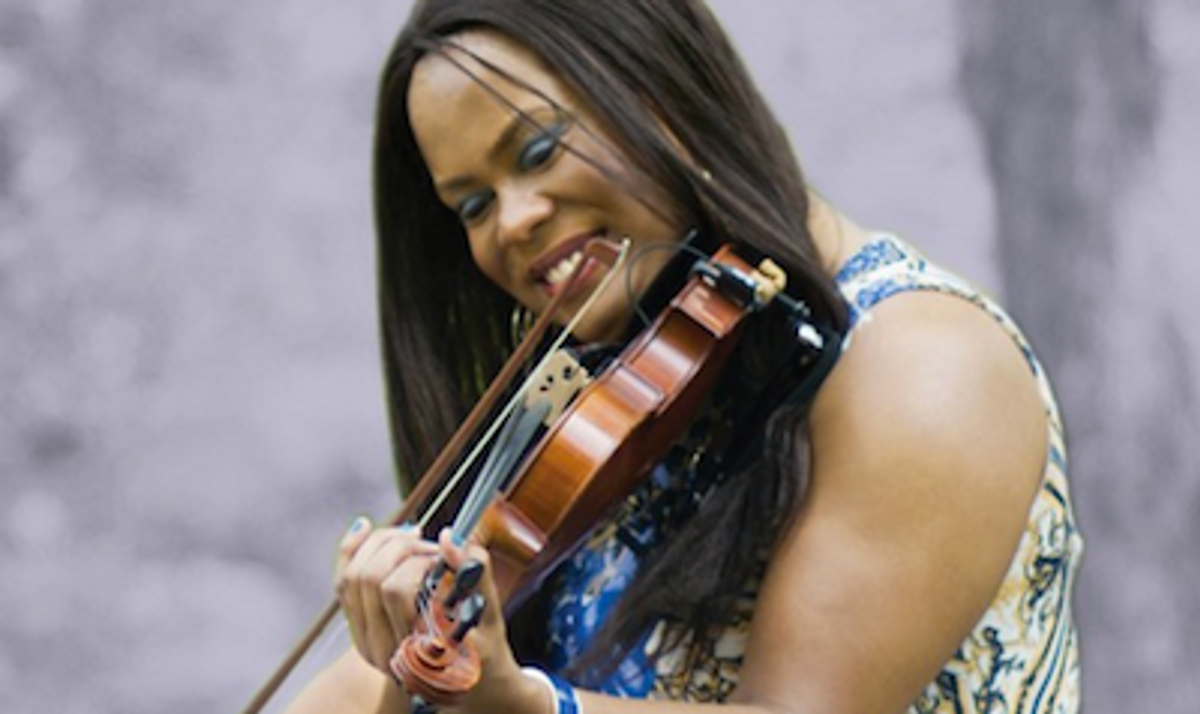Sissieretta Jones made history June 15, 1892, by being the first African-American female to sing at Carnegie Hall. It took 122 years, but now the first openly transgender African-American performer will play the hallowed venue when the violinist and mezzo-soprano takes the stage June 25, 2014.
With the support of GLAAD, Tona Brown looked to crowd-funding site IndieGogo to raise the budget needed to begin what will be the first LGBT Pride event at Carnegie Hall (although it's in the Weill Recital Hall, not the main stage). She'll perform selections by African-American and European composers, accompanied by pianist Charlie Gilmer. Tammy Peay, a comedian and television actress, will be the evening's host. We caught up with Brown to find out how it feels to make history.
Out: How does it make you feel to be the first trans African-American woman to play at Carnegie Hall, 122 years after Sissieretta Jones?
Tona Brown: I am deeply honored to perform at Carnegie Hall after African-American divas like Sissieretta Jones, Marian Anderson, Leontyne Price, and Kathleen Battle. From the moment I walk out on that stage, I'll think of these proud and distinguished ladies that came before me. Carnegie Hall is the quintessential recital hall in which to perform such a historic event, that's why it's titled "From Stonewall to Carnegie Hall."
Who are the people that have helped you to get to this monumental occasion?
Other than the ones I mentioned, a few notables I should mention are soprano Shirley Verrett, who told me never to give up and to find my own niche while pursuing my career. Other artists outside of the music field like author Lee Geiger, who wrote the book Pearls of Asia, supported me in an integral way, and made this event possible. There was also the love, guidance, and strength of my mother, aunt and grandmother, from early on.
 How did you get started, so that you would end up performing this concert?
How did you get started, so that you would end up performing this concert?
My artistic road started at the age of 10, taking orchestra in public school in Virginia. The concert's program was started from a conversation with Nathan James, who felt that I should perform at Carnegie Hall. The purpose of the concert is to raise awareness of transgender issues--both past and present--and to educate people about the Stonewall rebellion and the role transgender men and women played in the rebellion.
What were the hurdles that you faced/are still facing?
Fear. The one all transgender Americans face, trying to gain a level of respect and acceptance from the general public. We face an outrageous degree of difficulty in today's society, with studies showing high levels of poverty, suicide, and murder grossly disproportionate to any other community in our country. I find it really sad, actually, that in 2014, I am the first African-American trans woman to perform at Carnegie Hall (that we know of).
What has helped you to stay focused on the "prize" during uncertain times?
Spirituality and the ability to look at the bigger picture. Not everyone is going to like you, or appreciate you, but in the end, it doesn't matter. I am still doing what I was put on this planet to do. My primary focus is to share the works of African-American composers, and to do as much research as possible, to find hidden gems, and perform them on concert stages. After all, it's my music that will live on, long after I leave my earthly body.
We've had Janet Mock's bestselling memoir, Redefining Realness, Carmen Carrera on the Life Ball poster, Laverne Cox on the cover of Timemagazine, and now your concert. Do you think America is finally shifting its views on trans people?
True change takes time, and we are now seeing a group of strong trans women that are not living in fear. Instead, they're sharing their lives with the world, openly. America is far behind than other countries, when it comes to understanding transgender individuals, but we are getting there.
There are many heated debates in the media regarding trans people and their genitalia, along with their identity and the use of the word "tranny" as a slur. What are your thoughts?
When we tend to focus on a person's genitalia and not who they are as a person, it does a disservice to everyone. This makes transgender people look like "weirdos" or "freaks." We need to change the paradigm of conversation by focusing on the individual, not what surgeries they have or haven't had. Being transgender is not about looks, but one's content of character and spirit. As far as the word "tranny," I do not identify with it or use it, because of all of its negative connotations, but I know others that do. It's an individual choice. Use whatever language you deem appropriate, just know your audience.
Anything you would like people to take away from your concert?
This concert will educate the audience about the plight of LGBT Americans from 1969 through today. It will also showcase the repertoire of African-American composers' rarely programmed works, which needs exposure. Hopefully everyone in attendance will leave with a different perspective about what is possible for transgender people in general, and especially, transgender women of color.
The concert takes place June 25, 7:30 p.m. Carnegie Hall, Weill Receital Hall, 154 W. 57th St., NYC. For tickets visit CarnegieHall.org


































 How did you get started, so that you would end up performing this concert?
How did you get started, so that you would end up performing this concert?





















































